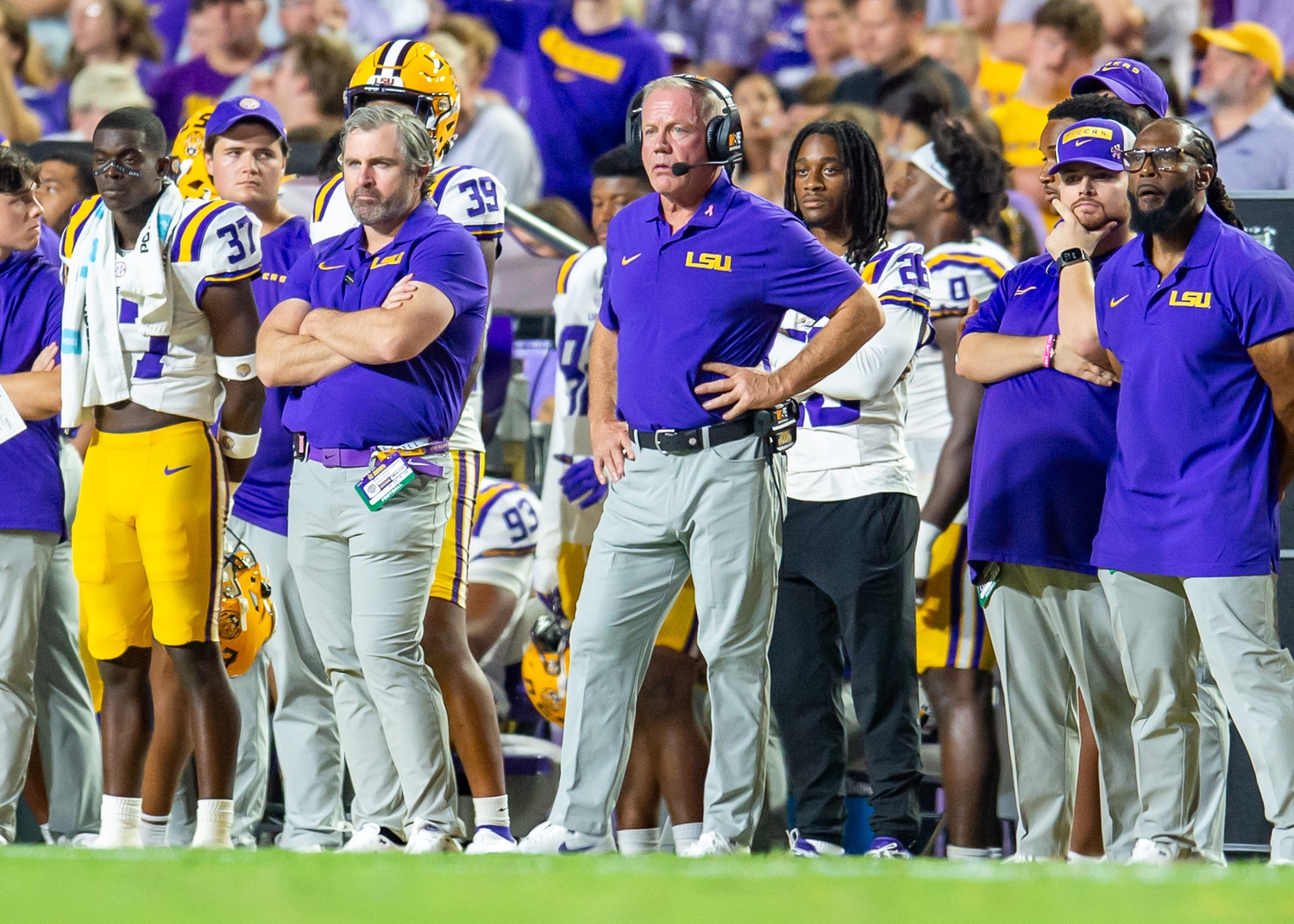The LSU-Alabama football game on Saturday is a matchup with major College Football Playoff implications, but a live tiger might be the biggest storyline of them all.
LSU keeps a tiger in a $3.7 million on-campus habitat built in 2005, and used to bring it to games, paraded on a trailer with cheerleaders riding on top—but stopped the practice in 2015 because the tiger had a negative reaction to the lights and sounds at a game. Now, a tiger is being brought from Florida to revive the tradition, apparently at the behest of Louisiana Gov. Jeff Landry, who has been pushing for a live cat at an LSU game for weeks.
LSU’s Mike VII—the school’s official mascot and seventh tiger named after athletic department trainer Mike Chambers, who helped the school get a live tiger in the mid-1930s—does not attend football games. The new tiger belongs to a man with a long history of violations and animal rights abuses, specifically the mistreatment of tigers.
“Whether it’s Mike or any other tiger, a football stadium is no place for a tiger,” PETA’s associate director of captive wildlife research, Klayton Rutherford, tells Front Office Sports.
On Oct. 1, Landry said in an unrelated press conference that bringing Mike VII on the field would be an “unbelievable opportunity.” He also said it could help the team win more games and “bring back the magic,” a reference to former football coach Gerry DiNardo. LSU vice presidents John Walters and Courtney Phillips told Landry last month that the veterinary school wouldn’t allow Mike VII onto the field. And two veterinarians-turned-state-legislators, Bill Wheat and Wayne McMahen, said the same in August, according to NOLA.com.
“As you would expect, it would be very difficult to be able to try to move Mike out of an area he’s never been out of,” Landry told the outlet Thursday.
So, Landry found another tiger—which has brought another layer of controversy. Rutherford released a statement Thursday condemning the decision to bring a tiger back to the game, calling it “shameful and out of touch.”
“LSU rightly ended this idiotic, archaic practice nearly a decade ago after recognizing that it was cruel to subject a sensitive big cat to the noise, lights, and crowds in a football stadium,” the statement read. Rutherford tells FOS that LSU is doing right by protecting Mike, but is “sparing Mike and allowing another tiger to suffer instead.”
The top-ranked matchup is also a night game, which means the animal will be exposed to bright stadium lights, while inside a small cage, and 100,000 or more screaming fans at Tiger Stadium. “I don’t think that would be in his best interest at all,” James Carpenter, a veterinary professor emeritus at Kansas State University who specializes in exotic and wild animals, tells FOS. He also describes tigers as being “isolated” and “secluded” in the wild, even from one another, making them even more unfit for a stadium environment. Other universities such as Texas, Georgia, Georgetown, and Florida State bring live mascots to sporting events.
Mike VII and his three predecessors have all come from wildlife rescue organizations. “LSU has not purchased a tiger since Mike III in 1958, and LSU does not support the for-profit breeding of tigers,” according to the school’s Tiger Athletic Foundation website. “By providing a home for a tiger that needs one, LSU hopes to raise awareness about the problem of irresponsible breeding and the plight of tigers kept illegally and/or inappropriately in captivity in the U.S.”
An Owner With a History of Animal Mistreatment
But, it appears LSU wasn’t involved in getting the tiger for the Saturday game, or making sure the process met the veterinary school’s standards. According to LouisianaSports.net, which first reported news of the tiger at the game, Landry facilitated the delivery of the new tiger.
The tiger for Saturday’s game belongs to Mitchel Kalmanson, a former circus exhibitor who PETA’s Rutherford says has “been on our radar for a very long time.” He is tied to Lester Kalmanson Agency, which specializes in animal insurance, providing animals for events like circuses and petting zoos, and exotic animal transport. The firm’s website says Kalmanson has transported animals including pandas, lions, and marine mammals throughout North America, South Africa, Asia, and Europe. The tiger for Saturday’s game is named Omar Bradley (after the former U.S. Army general and first Joint Chiefs of Staff), and it will take roughly 10 hours to transport the tiger from the Orlando area to Baton Rouge.
PETA has been a longtime critic of Kalmanson’s practices, saying he has “failed to meet minimum federal standards.” Violations have involved transporting animals, incorrectly storing food, insufficiently trained staff, and failing to get animals proper veterinary care.
In 2003 and 2004, tigers traveling with Kalmanson escaped, according to PETA. In 2006, USDA inspection reports show Kalmanson failed to give big cats a proper diet, resulting in two cubs contracting a preventable bone disease and one of them dying. In 2015, Kalmanson denied tigers daily exercise and kept them in transport vehicles with maggots and flies, a bad smell, food waste, excreta, and exposed insulation, according to a USDA inspection report.
The USDA wrote Kalmanson up as recently as January for being unable to pull up necessary records and veterinary care programs for a tiger and fox. A spokesperson for the USDA tells FOS Kalmanson holds a USDA license to exhibit animals to the public, and LSU didn’t need a USDA permit to bring in the tiger, though it may have needed state or local permits.
It’s unclear how or why Landry chose him for Saturday’s game. It’s also not clear how much money is being exchanged, who exactly is paying for the tiger, or the measures in place to keep the tiger, players, staff, and fans safe.
“Our hope is that maybe we can get this tiger to roar a couple of times, and that’ll indicate how many touchdowns we’ll have and it’ll be more than Alabama,” Landry said Friday on Fox News.
Kalmanson, the governor’s office, LSU, and the Fish and the U.S. Wildlife Service did not immediately return requests for comment.






![[Subscription Customers Only] Jun 15, 2025; Seattle, Washington, USA; Botafogo owner John Textor inside the stadium before the match during a group stage match of the 2025 FIFA Club World Cup at Lumen Field.](https://frontofficesports.com/wp-content/uploads/2026/02/USATSI_26465842_168416386_lowres-scaled.jpg?quality=100&w=1024)
![[Subscription Customers Only] Jul 13, 2025; East Rutherford, New Jersey, USA; Chelsea FC midfielder Cole Palmer (10) celebrates winning the final of the 2025 FIFA Club World Cup at MetLife Stadium](https://frontofficesports.com/wp-content/uploads/2026/02/USATSI_26636703-scaled-e1770932227605.jpg?quality=100&w=1024)









